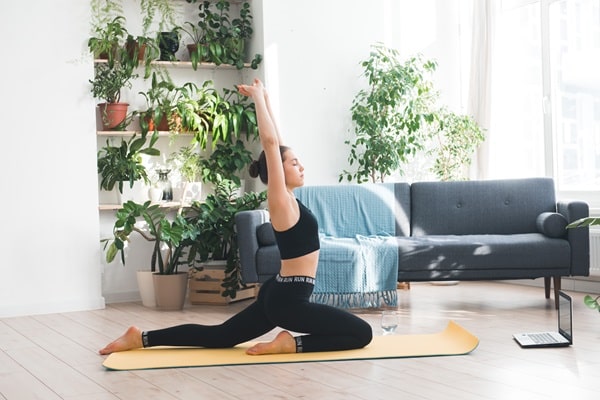Mental health, a critical aspect of overall well-being, is often nurtured through various methods, including exercise. Engaging in physical activities is not only beneficial for physical health but profoundly improve mental health by alleviating symptoms of stress, anxiety, and depression. This post explores a range of exercises specifically aimed at boosting mental health. From the calming flows of yoga to the vigor of aerobic exercises, each section unveils how different physical activities contribute to a healthier, happier mind, offering practical tips to incorporate these exercises into your daily routine.
Contents
The Connection Between Mental Health and Exercise

The intricate relationship between physical activity and mental health is well-established, with numerous studies highlighting how regular exercise can lead to significant improvements in mood and cognitive function. Engaging in physical activity releases endorphins, often referred to as ‘feel-good’ hormones, which act as natural stress relievers and mood lifters. Beyond immediate emotional benefits, consistent exercise also contributes to long-term mental health by enhancing brain function, increasing resilience, and reducing symptoms of mental health disorders such as depression and anxiety.
Understanding this connection is crucial for recognizing exercise as a powerful tool in the mental health toolkit. It’s not just about the quantity but the quality and type of exercise that aligns with individual preferences and needs. While some may find solace in the quiet intensity of weightlifting, others might thrive in the dynamic movements of a dance class. The key is to explore various forms of physical activity to understand how each can cater to different aspects of mental well-being, such as stress reduction, improved self-esteem, and enhanced emotional regulation.
Aerobic Exercises

Aerobic exercises, characterized by their ability to increase the heart rate and improve oxygen circulation throughout the body, are particularly beneficial for mental health. Activities like walking, running, and swimming not only bolster physical endurance but also help in reducing anxiety and depression. The rhythmic nature of these exercises provides a meditative effect, allowing individuals to find a sense of peace and rhythm in their routine, effectively quieting the mind’s chatter and fostering a sense of well-being.
Incorporating aerobic exercises into one’s daily life doesn’t require monumental changes; it’s about integrating small, manageable steps toward a more active lifestyle. Start with brisk walking, gradually increasing the pace and duration, or take up swimming sessions a few times a week. The objective is to build these activities into your schedule in a way that feels enjoyable and sustainable. Over time, as endurance builds and mental health benefits become more pronounced, these aerobic activities become a cherished part of one’s routine, offering both physical and mental rejuvenation.
Strength Training

Strength training goes beyond building muscle and physical prowess; it is equally effective in fortifying mental health. Engaging in weightlifting or resistance exercises challenges the body and mind, leading to improved focus and mental clarity. As individuals push through the physical demands of strength training, they develop a sense of mastery and control, which translates into higher self-esteem and confidence. The discipline and routine associated with strength training also provide a framework for mental resilience, teaching the mind to push through challenges and overcome obstacles.
Starting a strength training routine can be as simple as incorporating bodyweight exercises at home or engaging with weights at a gym. The key is to focus on gradual progression, listening to your body, and respecting its limits while steadily pushing for improvement. As physical strength builds, so does mental fortitude, with each session contributing to a stronger, more resilient self. Moreover, the strategic focus required during strength training helps in diverting the mind from daily stressors, providing a much-needed break and mental clarity.
Yoga and Flexibility Exercises

Yoga, with its deep roots in holistic wellness, offers a unique blend of physical and mental exercises that promote flexibility, strength, and mental tranquility. The practice of yoga encompasses a variety of poses and techniques that focus on breath control, flexibility, and meditation. As individuals engage in yoga, they embark on a journey of self-discovery and inner peace, learning to harmonize their breath and movements, which in turn leads to a calm and focused mind. This mindful movement is particularly effective in reducing stress, anxiety, and negative emotions, fostering a sense of balance and emotional stability.
Integrating yoga and flexibility exercises into your routine can start with just a few minutes each day, gradually building as comfort and capability grow. Whether it’s through attending a class, following an online tutorial, or practicing in the tranquility of your own space, yoga is adaptable to various lifestyles and preferences. As the body becomes more flexible, so does the mind, learning to adapt and flow with life’s challenges. The practice of yoga encourages a mindful approach to daily living, enhancing mental well-being through increased awareness and inner peace.
Mind-Body Exercises

Mind-body exercises like Tai Chi and Pilates offer a holistic approach to mental and physical health, emphasizing the connection between mental focus and physical movement. These practices involve slow, deliberate movements coupled with deep breathing and mental concentration, leading to a state of relaxation and heightened awareness. Tai Chi, often described as meditation in motion, promotes tranquility through its gentle flows, reducing stress and anxiety, while Pilates focuses on core strength, posture, and balance, all of which contribute to a positive mental state.
The beauty of mind-body exercises lies in their adaptability and the gentle impact on the body, making them suitable for individuals of all ages and fitness levels. Regular practice of Tai Chi or Pilates can lead to significant improvements in mental health, including better stress management, reduced symptoms of depression, and enhanced cognitive function. By integrating these exercises into your weekly routine, you engage in a form of moving meditation that nurtures both the mind and the body, leading to a more balanced and serene state of being.
Breathing Exercises and Meditation

Breathing exercises and meditation are foundational practices in improving mental health, directly targeting the body’s stress response and promoting relaxation. Simple techniques such as deep diaphragmatic breathing or guided meditations can be powerful tools in managing anxiety, reducing stress, and improving concentration. These practices help in regulating the nervous system, leading to a decrease in heart rate and blood pressure, and creating a sense of calm and focus.
Incorporating breathing exercises and meditation into daily life can be straightforward and flexible. Starting with just a few minutes each day, individuals can explore various forms of meditation, such as mindfulness, loving-kindness, or body scan techniques. As these practices become regular, they cultivate a sense of inner peace and resilience, enhancing one’s ability to cope with the daily stresses of life. By dedicating time to these practices, individuals can create a sanctuary of calm within themselves, significantly improving their mental health and overall well-being.
Outdoor Activities and Nature Exposure

Engaging in outdoor activities and immersing oneself in nature is a refreshing way to boost mental health. Activities such as hiking, gardening, or cycling not only provide a great physical workout but also offer the therapeutic benefits of being outdoors. Exposure to natural environments has been shown to reduce stress, improve mood, and enhance cognitive function. The natural beauty and tranquility of outdoor settings provide a sense of peace and perspective, helping to alleviate feelings of depression and anxiety.
To reap the benefits of nature, one doesn’t need to venture far or engage in strenuous activities. Even regular walks in a local park or time spent tending to a garden can have profound effects on mental well-being. These activities encourage mindfulness and appreciation of the present moment, connecting individuals to the natural world and its calming influence. As people spend more time outdoors, they often experience a greater sense of vitality and well-being, making nature exposure an essential component of a holistic approach to mental health.
Recreational Sports and Team Activities

Participating in recreational sports and team activities is not only fun but also beneficial for mental health. Engaging in sports such as basketball, soccer, or group fitness classes provides a structured way to exercise while offering the added benefits of social interaction and teamwork. These activities foster a sense of community and belonging, reducing feelings of loneliness and isolation. Moreover, the competitive aspect of sports can be a healthy outlet for stress, encouraging resilience and perseverance.
Incorporating team activities into one’s life can be a great way to combine physical exercise with social interaction, enhancing overall well-being. Whether joining a local sports league or gathering friends for a casual game, the emphasis is on enjoying the activity and the camaraderie that comes with it. As individuals engage in these activities, they build not only physical strength but also social connections and mental toughness, contributing to a more active and fulfilled life.
Move Your Way to a Healthier Mind
The journey to enhance mental health through exercise is both rewarding and transformative. The variety of activities discussed, from the tranquility of yoga to the energy of recreational sports, offers something for everyone. You are encouraged to explore these options, find what resonates with you, and make physical activity a regular part of your life. As you embark on this path, remember that each step, each movement, is a stride towards a healthier, happier mind. Embrace exercise not just as a routine but as a key to unlocking your mental wellness.


